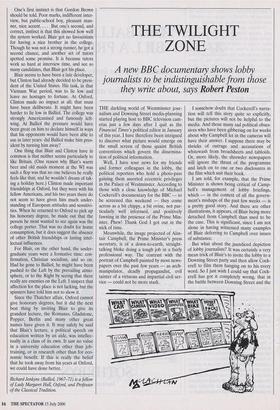DID BALLIOL MAKE BILL A PRESIDENT?
Richard Jenkyns looks back at how their
Oxford experiences may have moulded
Tony Blair and Bill Clinton
SO Balliol College, Oxford managed to turn away both Bill Clinton and Tony Blair in the space of a few years. That raises some interesting questions. Why did Balliol feel it could manage without them? What difference would it have made if it had taken them? And what effect did their Oxford years have on either of them?
The two cases are rather different. Anyone who wins a Rhodes Scholarship has already achieved a huge success. At the time of Clin- ton's application, many more Americans picked Balliol than any other college; choos- ing between a lot of outstanding candidates is always a bit of a guess; and the Rhodes trustees like to distribute their scholars rea- sonably evenly between the colleges. It is a pity that the word 'reject' is so often used of candidates not accepted; many candidates have to be turned away simply for lack of room. That Clinton missed Balliol was not much more than the luck of the draw.
Blair applied to read law but sat entrance papers in English. His elder brother was already reading law at Balliol. Tony's marks have, by chance, surfaced in the last fortnight and have been deposited in a library, for the benefit of future historians, but it is known that they were not much good. Blair did not shine at the interview with the law tutors. But he got an interview at another college, St John's, and was accepted. One's first instinct is that Gordon Brown should be told. Poor marks, indifferent inter- view, but public-school boy, pleasant man- ner, nice accent. . . . But one's second, and correct, instinct is that this showed how well the system worked. Blair got no favouritism for having a nice brother in the college. Though he was not a strong runner, he got a second chance, and another set of tutors spotted some promise. It is because tutors work so hard at interview time, and see so many candidates, that Blair got his place.
Blair seems to have been a late developer, but Clinton had already decided to be presi- dent of the United States. His task, in that Vietnam War period, was to lie low and leave no hostages to fortune. At Oxford, Clinton made no impact at all; that must have been deliberate. It might have been harder to lie low in Balliol. The college was strongly Americanised and famously left- wing. At Balliol the pressure would have been great on him to declare himself in ways that his opponents would have been able to use in later years: did Balliol make him pres- ident by turning him away?
One thing that Blair and Clinton have in common is that neither seems particularly to like Britain. (One reason why Blair's warm beer and old maids moment at the WI was such a flop was that no one believes he really feels like that; and he wouldn't dream of tak- ing a holiday here.) Clinton made important friendships at Oxford, but they were with his fellow Americans, and his two years there do not seem to have given him much under- standing of European attitudes and sensitivi- ties. When he returned to Oxford to pick up his honorary degree, he made out that the person he most wanted to see again was the college porter. That was no doubt for home consumption, but it does suggest the absence of other British friendships or lasting intel- lectual influences.
For Blair, on the other hand, the under- graduate years were a formative time: con- firmation, Christian socialism, and so on. Had he gone to Balliol, he might have been pushed to the Left by the prevailing atmo- sphere, or to the Right by seeing that there really are enemies on the Left. I suspect that affection for the place is not lacking, but the spinners have told him not to show it.
Since the Thatcher affair, Oxford cannot give honorary degrees, but it did the next best thing by inviting Blair to give its grandest lecture, the Romanes. Gladstone, Popper, Berlin and many other great names have given it. It may safely be said that Blair's lecture, a political speech on education written by an aide, was intellec- tually in a class of its own. It saw no value in a university education other than job- training, or in research other than for eco- nomic benefit If this is really the belief that he took away from his years at Oxford, we could have done better.
Richard Jenkyns (Balliol, 1967-71) is a fellow of Lady Margaret Hall, Oxford, and Professor of the Classical Tradition.



























































 Previous page
Previous page